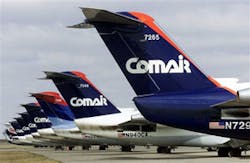The deadly Kentucky crash involving a Comair flight could make the regional carrier's survival even tougher.
Comair has been operating under bankruptcy protection for nearly a year and has been battling with its flight attendants over pay cuts. Last week its parent, Delta Air Lines Inc., put some of its regional jet service out to bid - a move that could weaken Comair. Sunday's crash that killed 49 people puts Comair in an even more precarious position.
"Certainly, there's a large burden on both management and the employees," Standard & Poor's airline analyst Philip Baggaley said Monday.
Pete Janhunen, a spokesman for the Air Line Pilots Association, which represents Comair's pilots, said many people saw the cost cuts coming, but no one expected the crash on top of that.
"The unfortunate truth is it is a Comair plane and it will have some reverberation outside the Comair pilot group and the Comair airline," Janhunen said. "I'd say it's probably too early to tell how this will all play out."
Neither Comair nor Delta would talk about Comair's future on Monday, though Comair spokeswoman Kate Marx said "we will be answering those restructuring questions at some point."
Delta spokeswoman Betsy Talton said in an e-mail that the airline believes "it is too early to have this conversation."
"It would be insensitive to the families affected to do so at this time," Talton said, adding that Delta will revisit the issue "when the timing is more appropriate." Delta has been largely silent since the crash, referring questions to Comair.
The problems facing Comair were already clear before Comair Flight 5191 crashed after trying to take off from the wrong runway at the Lexington, Ky., airport on its way to Atlanta.
On Aug. 22, Atlanta-based Delta said it had requested bids for some of its regional jet service, much of which is now handled by Erlanger, Ky.-based Comair. The announcement came a day before Comair was to return to negotiations with its flight attendants over concessions the company said it must have to get out of bankruptcy.
David Treitel, chief executive of aviation consulting firm SH&E in New York, said the cost issue is critical to Comair's survival.
"The basic issue that Comair faces in terms of its business is obviously dealing with the crash, but also the issue of responding to the Delta (bid request) and dealing with a cost structure that enables it to be competitive," Treitel said.
The bid request that Delta put out could mean less revenue for Comair, and the crash now could mean fewer ticket sales, at least in the short-term, analysts said. Comair President Don Bornhorst said before the crash that Delta's announcement about the bid request made it even more important that Comair complete its restructuring so that it can keep what it has and win new service.
"I think very much depends on the extent to which people will continue to fly Comair," said Jeff Morris, a University of Dayton law professor and bankruptcy expert.
If pilot error is ultimately determined to be the cause of the crash, that might not cause a long-term impact on the airline if it isn't seen as a systemwide problem, Morris said.
"This seems like a tragic circumstance where one individual or more than one individual led to this tragic result and I would not expect it to recur," he said.
Another issue is whether the impact on Comair will trickle down to Delta, which is hoping to emerge from bankruptcy by the middle of 2007. That might help explain Delta's decision to refer questions to Comair, Morris said.
"To the extent they might try to keep this from combining in people's minds, that's I assume their goal," he said.
Plane crashes generally don't doom an airline, but they have done so.
ValuJet Flight 592 plunged into the Everglades in 1996, killing 110 people. ValuJet soon disappeared and was reborn as Orlando, Fla.-based AirTran Airways, a discount carrier that has made significant inroads at its hub in Atlanta that put it in direct competition with Delta on many routes.
As a result of the ValuJet crash, passenger airlines can no longer carry as cargo the oxygen generators blamed for starting the fire that brought down that flight. The maintenance contractor blamed for the mishandling of the oxygen generators - the fire started because safety caps weren't installed - was convicted in 1999 of criminal charges of recklessly supplying the devices and went out of business. The Federal Aviation Administration also ordered installation of fire detection and suppression systems in cargo areas.
Analysts said that the information made public so far about the Comair crash shows no similarities to the ValuJet crash, and that could be a good thing for Comair.
"There were a lot of other issues that came out regarding the ValuJet procedures that were a concern for the public," said SH&E's Treitel. "Thus far, we haven't seen any of those types of reports, and I don't expect that we will."
S&P's Baggaley said the crash could actually have a bonding effect among Comair employees.
"Events like this sometimes have the effect of bringing the company together because it focuses them on a problem they all share rather than one that pits management against labor," he said.
News stories provided by third parties are not edited by "Site Publication" staff. For suggestions and comments, please click the Contact link at the bottom of this page.






